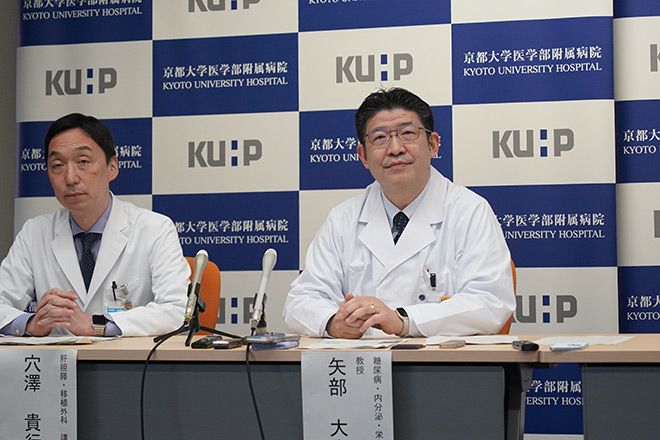KYOTO—Kyoto University Hospital officials announced on April 14 that a research team conducted a clinical trial in February to transplant lab-grown pancreatic islets into a woman in her 40s who has severe Type 1 diabetes.
Type 1 diabetes is a condition where the body destroys the pancreas’ insulin-producing cells.
The pancreatic islets, or group of cells within the organ, were made with human induced pluripotent stem (iPS) cells using a method developed by the Center for iPS Cell Research and Application at Kyoto University.
The technology creates “sheets” of these cells, and several were added to two areas of the patient’s abdomen during her surgery in February.
Each was about half the size of a business card and this human trial follows successful tests with mice and pigs.
After her operation, the patient spent a month recovering before being discharged and is currently visiting the hospital for follow-up checkups. The team confirmed she is making good progress.
Although the transplanted cells were derived from other individuals, it has not observed any transplant rejection or symptoms such as tumors forming.
Based on the surgery’s outcome, the team is expected to take on a second patient’s case in the near future and increase the number of cells transplanted.
“We would like to eliminate the need for insulin injections,” said Daisuke Yabe who leads the research team and is a professor at the university. “In the future, we would like to expand the target to children with Type 1 diabetes and apply the technology in the treatment of Type 2 diabetes, which is by far the most common form of diabetes.”
Type 1 diabetes is a disease in which the cells of the pancreas, which produce insulin to maintain blood sugar levels at a constant level, are destroyed due to immune abnormalities and other factors. It is different from type 2 diabetes, which can often be corrected by changing lifestyle habits such as diet and exercise.
Injecting insulin several times a day is the standard treatment for Type 1 diabetes, but it can be burdensome and lack of access could be life-threatening.
The estimated number of patients in the country is 100,000 to 140,000.
Although pancreatic islet transplants from deceased patients are available, there are only a few cases per year in Japan, and the chronic shortage of donors has become an issue.
Kyoto University Hospital here aims to make the technology to generate parts of organs for transplant patients commercially available in the coming decade if trials remain favorable.
The team intends to commercialize the technology in the 2030s if it can consistently prove the treatment’s effectiveness.
It plans to transplant the cells into two more adults between the ages of 20 and 65, and will observe whether the transplants are safe over the course of a year following each operation.
If these are successful, the team will go on to monitor if the procedure is effective at multiple facilities, including ones abroad.


AloJapan.com